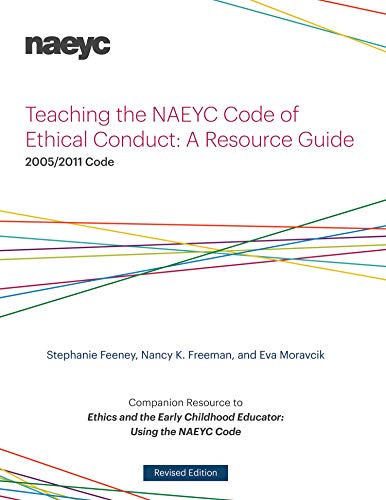
Synopsis
An Essential Guide to Using the NAEYC Code of Ethical Conduct
Information and guidance to help you teach new and experienced educators about professional ethics and the NAEYC Code of Ethical Conduct.
Special Features of This New Edition:
- Explains the needs of adult learners at different stages of professional development
- Details theories of moral development and their implications for ethical decision making
- Provides effective ways of teaching the NAEYC Code of Ethical Conduct
- Offers new and updated interactive activities, including games and a collection of cases for college classes and trainings on ethics
"synopsis" may belong to another edition of this title.
About the Author
Stephanie Feeney, PhD, is professor emerita of education at the University of Hawaii, where she taught courses in early childhood education. Her publications include textbooks, professional books, and children’s books. She is co-author of Ethics and the Early Childhood Educator and the Focus on Ethics column in Young Children.
Nancy K. Freeman, PhD, is professor emerita of education at the University of South Carolina in Columbia and has written and lectured extensively on professional ethics. She is co-author of Ethics and the Early Childhood Educator and of the Focus on Ethics column, a regular feature of NAEYC’s journal, Young Children.
Eva Moravcik, MEd, is professor of early childhood education at Honolulu Community College and is coordinator of a child development lab school. Her publications include textbooks and curriculum. She participated in the development of the NAEYC Code of Ethical Conduct supplements for program administrators and adult educators.
Excerpt. © Reprinted by permission. All rights reserved.
Ethics trainings can range from informal experiences, like a discussion in a child care center, to formal ones, such as college courses taken for credit. They can occur in a variety of settings, be of different durations, and have different goals. As an adult educator you plan very differently for veteran teachers in an in-service workshop than you do for a group of undergraduate students in an introductory course, or for a session at a conference that may be participants’ first exposure to ethics in early childhood education.
"About this title" may belong to another edition of this title.
Search results for Teaching the NAEYC Code of Ethical Conduct: A Resource...
Teaching the NAEYC Code of Ethical Conduct: A Resource Guide
Seller: Orion Tech, Kingwood, TX, U.S.A.
paperback. Condition: Good. Seller Inventory # 1938113225-3-31625669
Teaching the NAEYC Code of Ethical Conduct: A Resource Guide
Seller: Gulf Coast Books, Cypress, TX, U.S.A.
Paperback. Condition: Good. Seller Inventory # 1938113225-3-23475226
Teaching the NAEYC Code of Ethical Conduct: A Resource Guide
Seller: World of Books (was SecondSale), Montgomery, IL, U.S.A.
Condition: Good. Item in good condition. Textbooks may not include supplemental items i.e. CDs, access codes etc. Seller Inventory # 00046171814
Teaching the NAEYC Code of Ethical Conduct: A Resource Guide
Seller: Wonder Book, Frederick, MD, U.S.A.
Condition: Good. Good condition. A copy that has been read but remains intact. May contain markings such as bookplates, stamps, limited notes and highlighting, or a few light stains. Seller Inventory # W04F-01156
Teaching the NAEYC Code of Ethical Conduct : A Resource Guide
Seller: Better World Books, Mishawaka, IN, U.S.A.
Condition: Good. Revised. Used book that is in clean, average condition without any missing pages. Seller Inventory # 9478228-6
Teaching the Naeyc Code of Ethical Conduct: A Resource Guide
Seller: ThriftBooks-Atlanta, AUSTELL, GA, U.S.A.
Paperback. Condition: Good. No Jacket. Pages can have notes/highlighting. Spine may show signs of wear. ~ ThriftBooks: Read More, Spend Less 3.6. Seller Inventory # G1938113225I3N00
Teaching the Naeyc Code of Ethical Conduct: A Resource Guide
Seller: ThriftBooks-Atlanta, AUSTELL, GA, U.S.A.
Paperback. Condition: Very Good. No Jacket. May have limited writing in cover pages. Pages are unmarked. ~ ThriftBooks: Read More, Spend Less. Seller Inventory # G1938113225I4N00
Teaching the NAEYC Code of Ethical Conduct: A Resource Guide
Seller: Orphans Treasure Box, Champaign, IL, U.S.A.
paperback. Condition: Very Good. Pages are unmarked. Binding is tight. Name inscribed along bottom page edges. Ships quickly. Mild shelf/reading wear. Orphans Treasure Box sells books to raise money for orphans and vulnerable kids. Seller Inventory # 2CT-05222025-tfog016
Teaching the NAEYC Code of Ethical Conduct: A Resource Guide
Seller: HPB-Diamond, Dallas, TX, U.S.A.
Paperback. Condition: Very Good. Connecting readers with great books since 1972! Used books may not include companion materials, and may have some shelf wear or limited writing. We ship orders daily and Customer Service is our top priority! Seller Inventory # S_438594589
Teaching the NAEYC Code of Ethical Conduct: A Resource Guide
Seller: Textbooks_Source, Columbia, MO, U.S.A.
paperback. Condition: Good. Revised. Ships in a BOX from Central Missouri! May not include working access code. Will not include dust jacket. Has used sticker(s) and some writing or highlighting. UPS shipping for most packages, (Priority Mail for AK/HI/APO/PO Boxes). Seller Inventory # 002071801U
